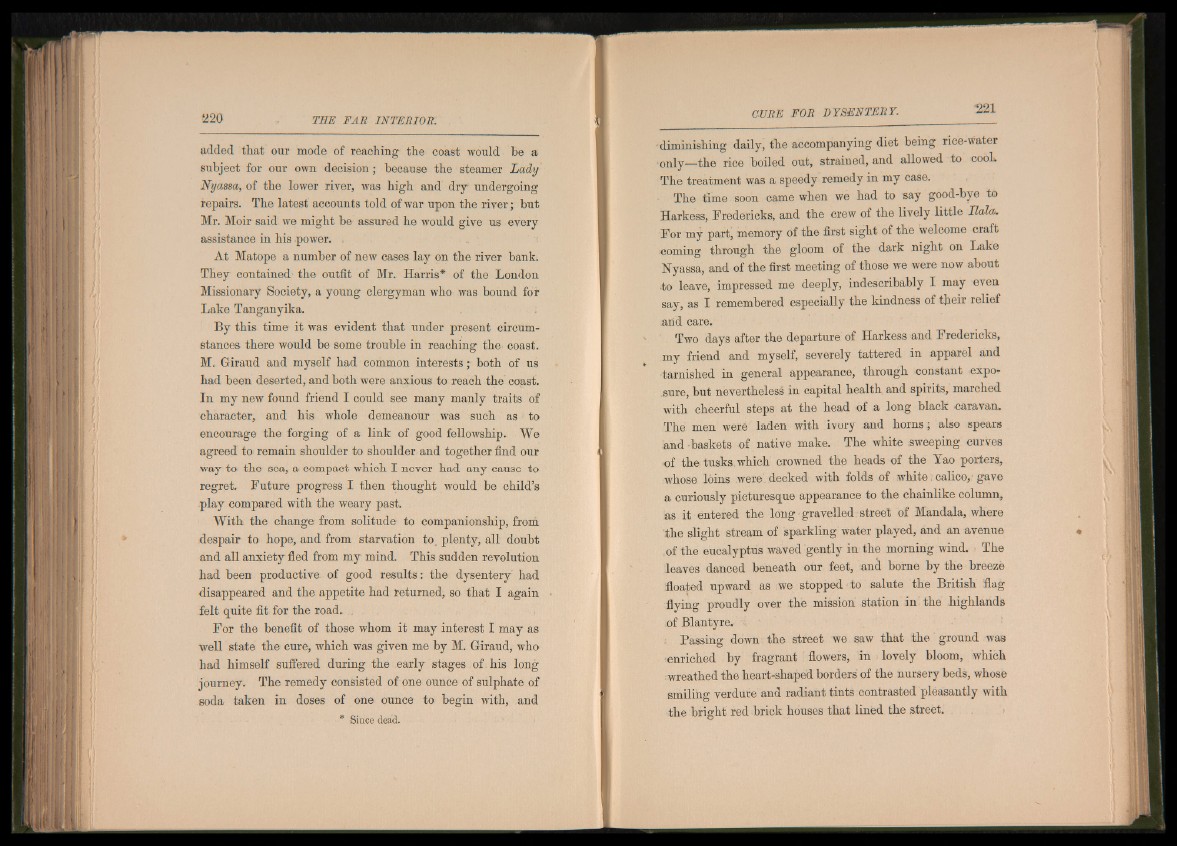
added that our mode of reaching the coast would be a
subject for our own decision; because the steamer Lady
Nyassa, of the lower river, was high and dry undergoing
repairs. The latest accounts told of war upon the river; but
Mr. Moir said we might he assured he would give us every
assistance in his power. .
At Matope a number of new cases lay on the river bank.
They contained the outfit of Mr. Harris* of the London
Missionary Society, a young clergyman who was bound for
Lake Tanganyika.
By this time it was evident that under present circumstances
there would be some trouble in reaching the coast.
M. Giraud and myself had common interests; both of us
had been deserted, and both were anxious to reach the coast.
In my new found friend I could see many manly traits of
character, and his whole demeanour was such as to
encourage the forging of a link of good fellowship. We
agreed to remain shoulder to shoulder and together find our
way to the sea, a compact which I never had any cause to
regret. Future progress I then thought would be child’s
.play compared with the weary past.
With the change from solitude to companionship, froni
despair to hope, and from starvation to. plenty, all doubt
and all anxiety fled from my mind. This sudden revolution
had been productive, of good results: the dysentery had
disappeared and the appetite had returned, so that I again
felt quite fit for the road. .
For the benefit of those whom it may interest I may as
well state the cure, which was given me by M. Giraud, who
had himself suffered during the early stages of . his long
journey. The remedy consisted of one ounce of sulphate of
soda taken in doses of one ounce to begin with, and
* Since dead.
diminishing daily, the accompanying diet being rice-water
•only—the rice boiled out, strained, and allowed to cook
The treatment was a speedy remedy in my case.
The time soon came when we had to say good-bye to
Harkess, Fredericks, and the crew of the lively little Halct.
For my part, memory of the first sight of the welcome craft
coming through the gloom of the dark night on Lake
Nyassa, and of the first meeting of those we were now about
•to leave, impressed me deeply, indescribably I may even
say, as I remembered especially the kindness of their relief
and care.
Two days after the departure of Harkess and Fredericks,
my friend and myself, severely tattered in apparel and
tarnished in general appearance, through constant exposure,
but nevertheless in capital health and spirits, marched
with cheerful steps at the head of a long black caravan.
The men were laden with ivory and horns; also spears
and baskets of native make. The white sweeping curves
of the tusks, which crowned the heads of the Yao porters,
whose, loins were decked with folds of white calico,-gave
a curiously picturesque appearance to the chainlike column,
as it entered the long gravelled, street of Mandala, where
'.the slight stream of sparkling water played, and an avenue
of the eucalyptus waved gently in the morning wind. The
leaves danced beneath our feet, and borne by the breeze
floated upward as we stopped to salute the British flag
flying proudly over the mission station in 'th e highlands
of Blantyre. v
Passing down the street we saw that th e ' ground was
enriched by fragrant flowers, in lovely bloom, which
wreathed the heart-shaped borders of the nursery beds, whose
smiling verdure and radiant tints contrasted pleasantly with
the bright red brick houses that lined the street.